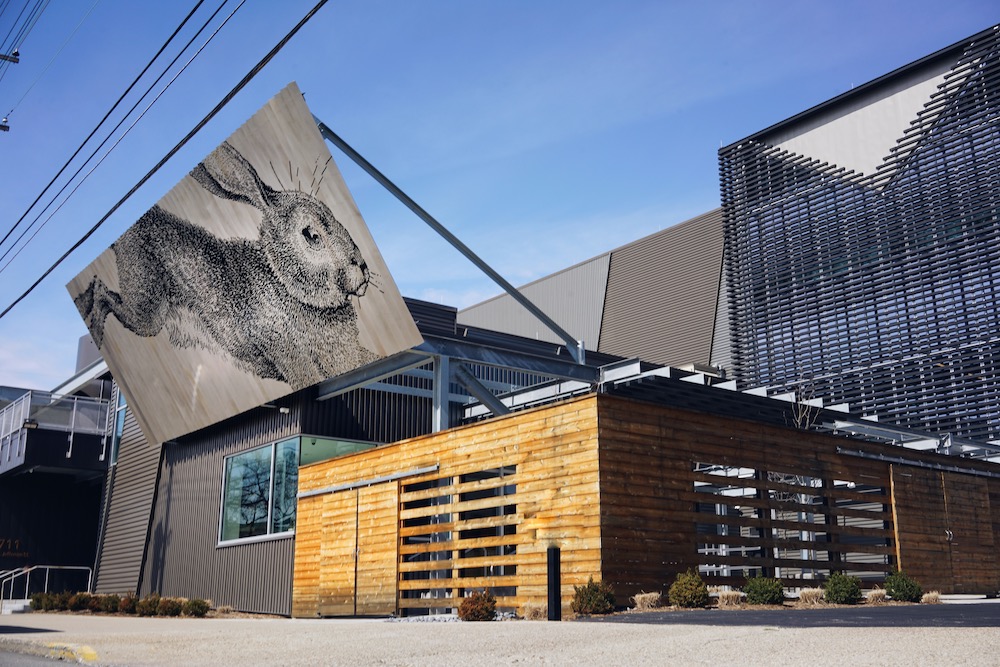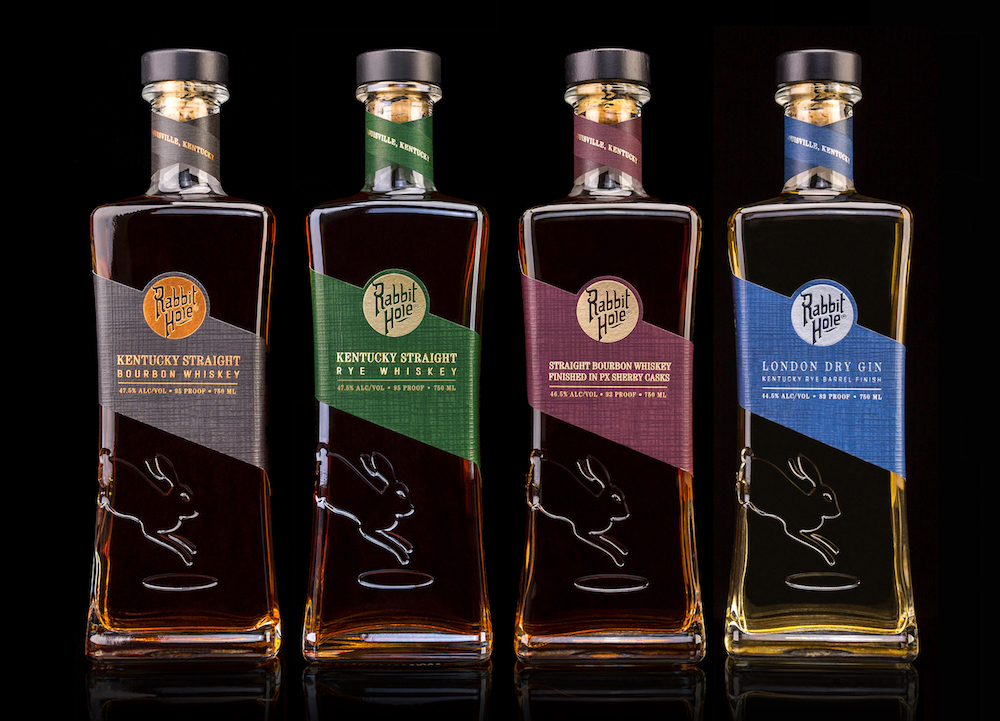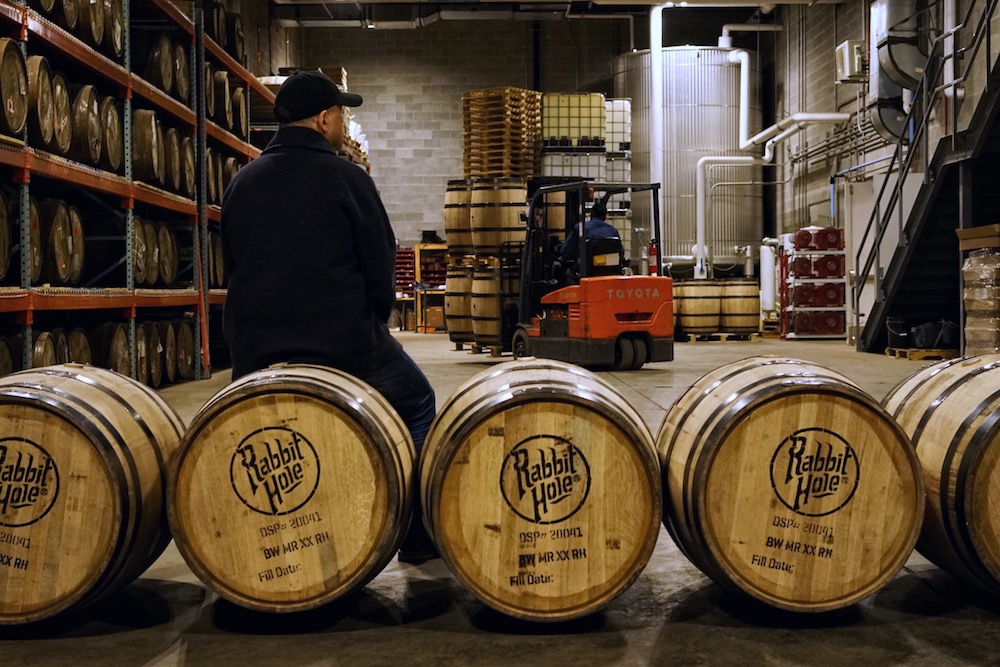Numerous distilleries have opened in the past decade during the whiskey boom, but what makes one pop?
Rabbit Hole Distillery is among the newer spots on the Kentucky Bourbon Trail, yet this Louisville-based producer has already carved out a reputation for its cutting-edge production and unique whiskey. The brand was founded in 2012 by Kaveh Zamanian, a PhD psychologist with a passion for wine and spirits. The name references his wife’s response to his desire to open a distillery: “You’re taking the family down the rabbit hole.”
Hard to believe anybody in the family could have foreseen this success. In 2018 Rabbit Hole opened a stunning, steel-and-wood distillery in downtown Louisville that looks as much like a modern art museum as a production space. And last month, Rabbit Hole entered into a strategic partnership with Pernod Ricard.

Few if any new craft distilleries have succeeded this quickly. Especially in Louisville, a historic epicenter of bourbon culture. I recently caught up with Zamanian to discuss how a newer whiskey brand has so quickly caught on with consumers.
Kyle Swartz: How did you first imagine your whiskey when creating this brand?
Kaveh Zamanian: I first approached it as a consumer. I was frustrated at how much sourced stuff there was on the market, which all has the same mash bill and tastes similarly. So I wanted to try bringing in some more personal recipes.
Back in the day, there were a lot more personal recipes at Kentucky distilleries, and not as much sourced stuff, so I wanted to help bring that back. I wanted to take a stab at using different mash bills.
What I wanted to do was bring a modern approach to whiskey-making. I wanted to bring attention to the beauty of American whiskey — specifically bourbon.
KS: Let’s talk about your mash bills. Rabbit Hole is atypical with its grain selection.
KZ: Our original bourbon is 70% corn, 10% malted barley, 10% malted wheat and 10% honey malted barley. I really took a lot of inspiration from the craft beer guys, who have been experimenting with unusual recipes for a long, long time. And I started out as a Scotch guy, so using 30% malted grains really makes me happy.
Being different really is where it’s at these days. Anybody can buy sourced whiskey and put it in a pretty-looking bottle. I think that consumers are more sophisticated now in what they’re buying, and with what they think American whiskey is. They want to know who’s behind the spirit, part and parcel. That’s what’s really driving the new generation of whiskey drinkers.
There’s such a glut of products out there already. We wanted to produce phenomenal bourbon and whiskey that adds to the wonderful whiskey that’s out there, rather than regurgitating what the market already has.

KS: You also differentiate your products through barrel selection.
KZ: We work with a local cooperage called Kelvin. Their barrels are completely handmade, wood-fired and fully toasted. You hear a lot now from other distilleries about doing toasted barrels, but we’ve always been doing that. We really believe that’s one of our quote-on-quote ‘secret sauces’. Toasted barrels help the whiskey get character, and brings out flavors that otherwise barrels would not. It allows caramelization in a way that’s outstanding.
We also have a dedicated partner in Spain for our Sherry cask-finished bourbon [68% corn, 18% wheat, 14% malted barley], which are handcrafted with the same level of attention.
KS: Visiting Louisville recently I heard a number of people refer to Rabbit Hole as the ‘high-tech’ distillery. What other modern production methods are you using?
KZ: We’ve put a lot of stock into using quality grains, particularly our malted grains. We’re about to release a new bourbon in the next month-and-a-half or two months with a high-rye recipe. It will also have 30% malted grain mash bill. We think of that kind of mash bill as being the signature part of Rabbit Hole, and what has brought out a lot of flavor.
We also look at the grain-cooking process as a big part of that flavor. It’s actually the only proprietary part of our entire production, the set points in temperature holding and other components. We’ve spent a lot of time in the lab that way, playing around with different processes. We have already established our fingerprints on our products just in the way that we cook our grains.
Also, we fill barrels at 110 proof, which is lower than normal, because we believe that brings more flavors forward as well.
KS: I’m typically an outspoken opponent of younger whiskey, but yours are among the tastier I’ve tried under three years old. How do you decide to release something so young?
KZ: I think there’s a sweet spot with aging, and it varies depending on the product. Our approach with tasting is always collective, with our team and panel. If collectively the team gives the thumbs up, then we bottle it. If not, then we do not. We have the luxury of doing every bottling run in small batches, only 13-to-15 barrels at a time.
That said, we’re also always working towards older expressions. We’re certainly holding back barrels for releases in future years. We’re looking forward to a cask strength release in the near future for our bourbon and our rye, which should both be more than four years old.
KS: Tell me about your downtown distillery.
KZ: I’m a city guy, so I wanted to make sure that we were an urban distillery. And I wanted to make sure that we built in a way that engenders transparency. That’s why you see the glass-and-steel structure with a lot of open space. You’re lifted up off the production floor so that you can really see the process down there, soup to nuts.

KS: Following the partnership with Pernod Ricard, what’s next for Rabbit Hole?
KZ: It’s still a little surreal, looking back on the last couple of years. It really is a confirmation or affirmation that we’ve approached things the right way.
The Pernod Ricard partnership really has been interesting, as it allows us to scale up to a place where we can have more of a presence in the marketplace. I’m ecstatic that those guys came to the table.
At the same time, I never forget that I was able to get my start working at a place that allowed me to use their facility as a culinary distillery. So we like to make sure that Rabbit Hole gives back as well. A certain percentage of the distilling here will remain contract distilling. Currently we have the capacity to fill 20,000 barrels a year. Right now, we are not producing that many ourselves, so we like to allow other distillers to come in and experiment with their own creative takes through contract distilling.
Kyle Swartz is editor of Beverage Dynamics magazine. Reach him at kswartz@epgmediallc.com or on Twitter @kswartzz or Instagram @cheers_magazine. Read his recent piece, Tasting: The Balvenie ‘Stories’ Line.









